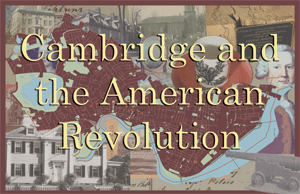Powder Alarm
The Coercive Acts of 1774 was a controversial series of parliamentary legislation that was intended to punish the rebellious Bostonians for the Boston Tea Party of 1773. It effectively closed the Port of Boston and dissolved colonial government, replacing it with a royally-appointed governing body named the Mandamus Council. Cambridge appointees included Thomas Oliver, along with Judges Samuel Danforth and Joseph Lee.
This loss of autonomy raised tensions in the colony between the citizens, who felt their rights were being undermined, and the military and appointed officials, who felt the citizens were not paying their fair share and were not being compliant. In the autumn of 1774, convinced that Cantabrigians were plotting to steal the remaining colony-owned powder from the Charlestown Powder house (which still stands in modern day Somerville), William Brattle informed Thomas Gage, the Commander In Chief and Royal Governor of Massachusetts Bay, of his apprehension about the gunpowder and the build-up of local militias. Brattle’s letter to Gage was lost and later found by a patriot who subsequently published it in a popular Boston newspaper.
Brattle was condemned for his role in the Powder Alarm, but it was General Gage who made the gravest error. Instead of quietly investigating the powder house inventory, he gathered 300 troops and sailed to Charlestown on a “secret” mission with the objective of seizing the remaining barrels. Removing the powder was fully within his jurisdiction as the governor of the colony; however, he misjudged the provincials’ reaction. The colonists perceived this operation as a provocative measure, and as an unwarranted exhibition of royal power.
By the following morning, approximately two and a half times the population of Cambridge, 4,000 people gathered on Cambridge Common. The public exposure of Brattle’s involvement in the incident transformed the provincials’ fear into rage. Patriot leaders utilized the power of the assembled crowd to protest their grievances.
They then demanded the resignation of Lieutenant Governor Thomas Oliver, as well as Judges Samuel Danforth and Joseph Lee who were all members of the Mandamus Council. Oliver presumed that Governor Gage would send troops to suppress the mob, and feared the potential violent confrontation. In an effort to prevent a conflict, he traveled to Boston to speak with General Gage. In due course, Oliver returned to Cambridge and was able to calm the crowds and returned to his house. However, later that day, a despised tax collector, Benjamin Hallowell, rode past the crowd in his private carriage. Within a few minutes 160 men on horseback were in full pursuit of Hallowell. With a pistol in each hand, Hallowell hopped on his servant’s horse and rode in a full gallop toward the safety of the fortified Boston walls.
This excitement agitated the crowds and they soon marched down Brattle Street and surrounded Lt. Governor Oliver’s house, demanding his resignation. He stepped down, saying: “My house in Cambridge being surrounded by about four thousand people in compliance with their commands I sign my name.”
In the months following the protest over the Mandamus Council, the Tories of Cambridge left, first moving to Boston which was much less volatile because of a larger British military presence.
